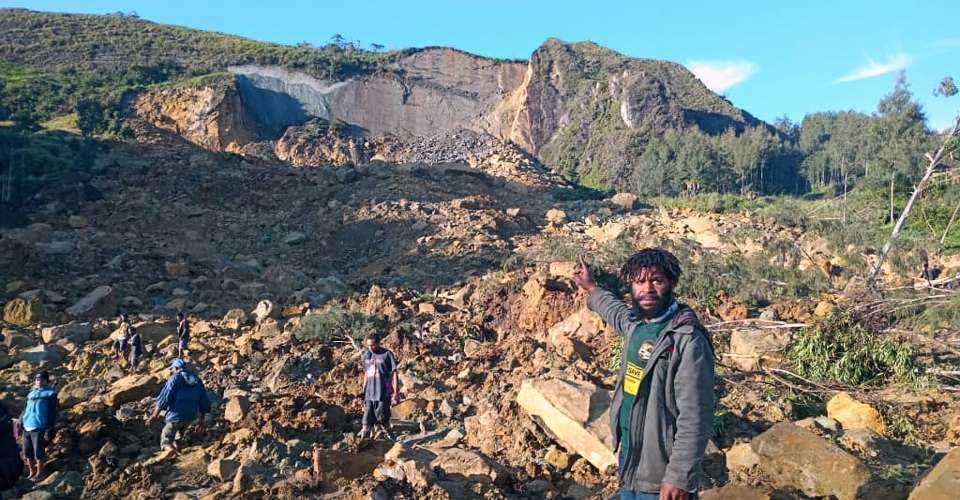
People gather at the site of a landslide in Maip Mulitaka in Papua New Guinea's Enga Province on May 24. (Photo: AFP)
A massive landslide struck remote villages in Papua New Guinea's highlands on May 24, with many homes buried and scores of residents feared dead.
The disaster hit an isolated part of Enga province at around 3:00 am local time, according to government officials, when many villagers were at home asleep.
Provincial governor Peter Ipatas told AFP that "there has been a big landslide causing loss of life and property."
He later said "six villages" had been affected and described it as an "unprecedented natural disaster."
Three bodies have so far been recovered, but there are fears that hundreds more may be entombed. The true toll may take days or weeks to become clear.
Steven Kandai, a community leader at the scene, told AFP that many residents had no time to flee.
"All of a sudden there was a big landslip. The mountain just collapsed all of a sudden while people were still sleeping," he said, adding their homes were "completely buried."
Others "heard a huge sound from rocks falling down and then escaped. But some went to escape, on their way they were killed by falling trees, rolling rocks," he said.
Images showed a scene of total devastation, with a vast bite of earth cleaved from densely vegetated Mount Mungalo.
The landslide left a vast brown scar of car-size boulders, felled trees and dirt that stretched down toward the valley floor.
The twisted remains of corrugated tin shelters and an overturned minibus could be seen at the foot of rubble.
Dozens of local men and women scrambled over the piles of rock and soil, digging, crying out, listening for survivors, or scanning the scene in disbelief.
Some became instant rescuers, donning Wellington boots, strapping on head torches, picking up machetes and long-handled axes to help clear the rubble.
Children could be heard crying as their mothers clambered over the rocks in search of loved ones.
Unknown toll
Near dusk on May 24, rescuers were using a mechanical digger and hand tools to try to unearth any survivors.
A rapid response team of medics, military, police, engineers, and UN agency personnel has been dispatched to the area.
Hospitals, health workers, relief agencies, and government personnel across the region have been placed in an "active state of alertness."
Prime Minister James Marape said the team would be there to help with "relief work, [the] recovery of bodies, and reconstruction of infrastructure."
"I extend my heartfelt condolences to the families of those who lost their lives," he said.
Vincent Pyati, president of the local Community Development Association, told AFP the "landslide hit around three last night and it looks like more than 100 houses got buried."
"It is not yet known how many people were in those houses. The number of victims is unknown."
Nickson Pakea, president of the nearby Porgera Chamber of Commerce and Industry, said there are fears that up to 300 people may have been there at the time, a number that could not be confirmed.
Aid agencies including the Papua New Guinea Red Cross and CARE said they were on standby and working to find out more.
Red Cross PNG interim secretary general Janet Philemon told AFP the landslide location was remote and that it could take up to two days for emergency services or aid to reach the area.
The nearest highway, which runs to the gold mining town of Porgera, was blocked, complicating relief efforts.
Papua New Guinea's National Disaster Management Office did not immediately give a toll.
The Red Cross estimates the number of injured or dead could be between 100 and 500. But Philemon said she was "trying to get a clearer picture of what the situation is."
The agency was ready to offer first aid, blankets, and non-food items to those affected.
"There is no indication of an earthquake or anything that may have triggered [this event]. It is a gold mining area and people may have been gold mining on that mountain," she said.
Otherwise, the landslide may have been caused by heavy rain, Philemon suggested.
Sitting just south of the equator, the area gets frequent heavy rains.
This year has seen intense rainfall and flooding.
Community leader Kandai said villagers had been fearful since a smaller landslide struck the same area earlier this year but "they don't have any place to move to".
In March, at least 23 people were killed by a landslide in a nearby province.
"The loss of life and destruction is devastating," Australian foreign minister Penny Wong said, adding that her government "stands ready to assist in relief and recovery efforts".


